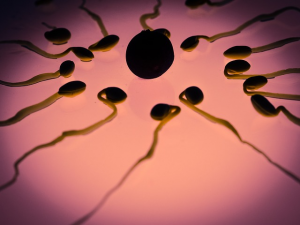
Data from two randomized controlled trials have shown that selenium supplementation has the following significant beneficial effects [Salas-Huertos]:
- improved sperm volume and concentration
- improved sperm motility
- improved sperm morphology
Selenium supplementation at 100 micrograms per day for 3 months improved sperm motility and increased the chance of conception. Selenium supplementation at 200 micrograms per day for 6 months improved semen volume, total sperm count and concentration, and sperm morphology [Salas-Huertos].
Data from five other randomized controlled trials have shown that Coenzyme Q10 supplementation is significantly associated with the following beneficial effects:
- improved sperm count
- improved sperm concentration
- improved sperm motility
- improved sperm morphology
The Coenzyme Q10 supplementation was most effective when the supplementation was in the range of 200 – 300 milligrams per day (in divided doses) for at least 3 months and especially after 6 months [Salas-Huertos].
Selenium and Coenzyme Q10 and Sperm Parameters
The data suggest that supplementation with selenium and Coenzyme Q10 may help to modulate male fertility [Salas-Huertos].
Oxidative stress – an excess of harmful free radicals in relation to protective antioxidants – is a strong mediator of male infertility. Oxidative stress is associated with sperm dysfunctions and damage to sperm cells. High levels of harmful free radicals are associated with sperm DNA damage and low sperm motility [Salas-Huertos].
Both selenium in the form of selenoproteins – the glutathione peroxidases, thioredoxin reductases, and iodothyronine deiodinases – and Coenzyme Q10 in its reduced form play an important role as antioxidants, attenuating the extent of oxidative stress and cell damage.
Selenium and Coenzyme Q10: A Special Interrelationship?
In the KiSel-10 Study, Professor Urban Alehagen and a team of researchers randomly assigned senior citizens to take 200 micrograms of high-selenium yeast and 200 milligrams of Coenzyme Q10 or matching placebos daily for four years. The group taking the active treatment had the following beneficial outcomes [Alehagen]:
- reduced heart disease mortality
- improved heart function
- better health-related quality of life
Professor Alehagen has emphasized the special interrelationship between selenium and Coenzyme Q10. He has explained that inadequate intakes of selenium may prevent the cells from getting sufficient concentrations of Coenzyme Q10 and that sufficient Coenzyme Q10 levels are needed if the cells are to have optimal selenium function [Alehagen].
The antioxidant protective effect of selenium and Coenzyme Q10 that was seen in the KiSel-10 Study may also explain the beneficial effects of selenium and Coenzyme Q10 on sperm parameters.
Randomized Controlled Trials of Selenium and Coenzyme Q10
Randomized controlled trials are the gold standard design for supplement effectiveness research. Randomization is important because it ensures that every study participant has an equally good chance of being assigned to the active treatment group or the matching placebo group. Randomization is a method to reduce or eliminate the existence of bias in the assignment of study participants.
Controlled trials are trials in which the outcomes of the active treatment – the selenium supplement or the Coenzyme Q10 supplement – can be compared to the outcomes of the placebo supplement. Typically, the randomized controlled trials are double-blind studies. Neither the researchers nor the study participants know who is getting which intervention until the study has been completed and the seal on the code has been broken. Double-blinding a study eliminates the effect of expectation and suggestion, both on the part of the researchers and on the part of the study participants.
Summary: Selenium and Coenzyme Q10 and Male Fertility
According to the Linus Pauling Institute’s Micronutrient Information Center, the development of mature sperm cells and male fertility are highly dependent upon the availability of glutathione peroxidase-4 (GPx-4) selenoproteins.
There is evidence that the cells need sufficient concentrations of Coenzyme Q10 in order to have optimal selenium function. This may be as true of sperm cells as of muscle cells and nerve cells and other cells.
Evidence from randomized controlled trials shows that both selenium supplementation and Coenzyme Q10 supplementation improve sperm parameters.
Sources
Alehagen, U., Johansson, P., Björnstedt, M., Rosén, A., & Dahlström, U. (2013). Cardiovascular mortality and N-terminal-proBNP reduced after combined selenium and Coenzyme Q10 supplementation: a 5-year prospective randomized double-blind placebo-controlled trial among elderly Swedish citizens. International Journal of Cardiology, 167(5), 1860-1866.
Alehagen, U., & Aaseth, J. (2015). Selenium and Coenzyme Q10 interrelationship in cardiovascular diseases–A clinician’s point of view. Journal of Trace Elements in Medicine and Biology, 31: 157-162.
Salas-Huetos A, Rosique-Esteban N, Becerra-Tomas N & Vizmanos B. (2018). The effect of nutrients and dietary supplements on sperm quality parameters: a systematic review and meta-analysis of randomized controlled trials. Adv Nutr; 9(6): 833-848.
The information contained in this review article is not intended as medical advice and should not be used as such.
12 December 2019
